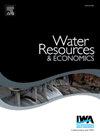Impact of irrigation pump ownership on farm productivity in rice-wheat cropping systems of Nepal Terai
IF 1.9
3区 经济学
Q2 ECONOMICS
引用次数: 0
Abstract
Groundwater irrigation is critical for supporting food security, rural livelihoods, and economic development in the Eastern Indo-Gangetic Plains (EIGP) of South Asia. However, groundwater resources in the EIGP remain underutilized due to farmers' reliance on expensive diesel pumps for accessing water. This study uses primary household survey data from the Terai region of Nepal to analyse the drivers of variability in irrigation access costs across farms, and how these cost variabilities influence agricultural outcomes. We employ an endogenous switching regression model to assess the impacts of pump ownership on farm productivity and profitability. Our findings show that pump ownership reduces irrigation costs rice and wheat cultivation, the region's two major crops, by 72 % and 76 %, respectively, and increases rice and wheat productivity by 37 % and 20 %, respectively. Our findings provide empirical evidence of the positive impact of technology ownership on agricultural productivity and highlight the opportunities for policy interventions focused on improving performance of existing technologies for enabling long-term sustainable intensification of irrigated agriculture in the EIGP.
灌溉泵所有权对尼泊尔Terai水稻-小麦种植系统农业生产力的影响
地下水灌溉对于支持南亚东部印度-恒河平原(EIGP)的粮食安全、农村生计和经济发展至关重要。然而,由于农民依赖昂贵的柴油泵取水,EIGP的地下水资源仍未得到充分利用。本研究使用来自尼泊尔Terai地区的主要家庭调查数据来分析各个农场灌溉获取成本变化的驱动因素,以及这些成本变化如何影响农业成果。我们采用内生转换回归模型来评估水泵所有权对农业生产力和盈利能力的影响。我们的研究结果表明,拥有水泵将该地区两种主要作物水稻和小麦的灌溉成本分别降低了72%和76%,并将水稻和小麦的产量分别提高了37%和20%。我们的研究结果为技术所有权对农业生产力的积极影响提供了实证证据,并强调了政策干预的机会,重点是提高现有技术的绩效,从而实现EIGP中灌溉农业的长期可持续集约化。
本文章由计算机程序翻译,如有差异,请以英文原文为准。
求助全文
约1分钟内获得全文
求助全文
来源期刊

Water Resources and Economics
Environmental Science-Water Science and Technology
CiteScore
5.00
自引率
0.00%
发文量
17
审稿时长
51 days
期刊介绍:
Water Resources and Economics is one of a series of specialist titles launched by the highly-regarded Water Research. For the purpose of sustainable water resources management, understanding the multiple connections and feedback mechanisms between water resources and the economy is crucial. Water Resources and Economics addresses the financial and economic dimensions associated with water resources use and governance, across different economic sectors like agriculture, energy, industry, shipping, recreation and urban and rural water supply, at local, regional and transboundary scale.
Topics of interest include (but are not restricted to) the economics of:
Aquatic ecosystem services-
Blue economy-
Climate change and flood risk management-
Climate smart agriculture-
Coastal management-
Droughts and water scarcity-
Environmental flows-
Eutrophication-
Food, water, energy nexus-
Groundwater management-
Hydropower generation-
Hydrological risks and uncertainties-
Marine resources-
Nature-based solutions-
Resource recovery-
River restoration-
Storm water harvesting-
Transboundary water allocation-
Urban water management-
Wastewater treatment-
Watershed management-
Water health risks-
Water pollution-
Water quality management-
Water security-
Water stress-
Water technology innovation.
 求助内容:
求助内容: 应助结果提醒方式:
应助结果提醒方式:


